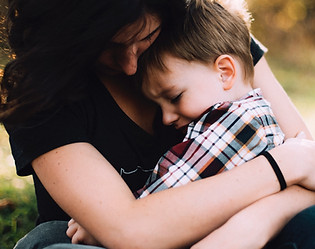for children
Children and teens process grief differently from adults. And, like adults, each one grieves in their own way. Adults need to view sthe grieving process not as a problem to be solved, but rather an experience that we all go through at some time in our lives, and how to get through it. Children need to be helped to understand that their feelings are normal and acceptable. Expect outbursts and behavior issues as they struggle to deal with the changes.
At least in the beginning, use the word "died" instead of a softer euphanism. Later, if you are discussing beliefs about death, you may choose to say "passed away" or some other term if that is how you better express your beliefs. Children need to know at the outset, however, that the deceased person is gone forever in the physical flesh.
There are many myths about dealing with sad emotions that confuse children and whose messages should be avoided:
- Time heals all wounds
- Replace the loss (We'll get you another dog.")
- Cry alone
- Be strong for others
- Bury your feelings
- Don't feel bad ("Have a cookie, you'll feel better.") Food should NEVER be used as direct consolation for grief.
Like adults, children can be shown how their loss can lead to personal growth. They can learn how to reach out for help and to help others who are also facing loss in their lives. Our children's programs at Dragonfly Heart include lots of exercises and activities that help children come to terms with their losses, begin to heal, and get to know themselves and others more in the process. Below are brief descriptions of two of our services available for children. Send us a message and we will contact you to set up a free initial consultation. Thank you.

END-OF-LIFE COMPANIONING
Helping children who are facing death

GRIEF RECOVERY
Program for children and teens

TIPS FOR HELPING CHILDREN
When in the grieving process
Children need to talk about their feelings and have them validated. They need to know that it's okay to grieve, to be in pain.
Kids are capable of deep spiritual perception and wisdom, and have the ability to find or suppose purpose in the face of illness and death. They may also have lots of questions.
A dying child can have last wishes and may even want to have a will. As with adults, they need to wrap up unfinished business and gain some sense of closure.
Our spiritual companioning program for children addresses all of the above issues and more that might come up. Send us a message with a brief description of your needs and we will arrange a no-obligation consultation. Our staff who work with children all have clearances, CPR training, and negative TB results.
Products and Publications
Online courses
Online coaching and consulting
The Grief Recovery options for children include:
1. A 12 -week group program adapted for children ages 3 and up (similar in nature to the Adult Outreach Program)
2. Individual facilitation sessions
3. A 6-week educational study group for adults to help children deal with death, divorce, pet loss, moving and other losses and to replace the above myths with practical guidance
Parents, guardians, study group recipients receive the book When Children Grieve by Russell Freedman upon registering.
Contact us about other ways to help children who are grieving a loss, by death, divorce or any other means.

-
Listen with your heart, not your head. Allow all emotions to be expressed, without judgment, criticism or analysis
-
Recognize that grief is emotional, not intellectual. Avoid the trap of asking your child what is wrong, for he or she will automatically say, "Nothing."
-
Adults - go first. Telling the truth about your own grief will make your child feel safe in opening up about his or her own feelings.
-
Remember that each of your children is unique and each has a unique relationship to the loss event.
-
Be patient. Don't force your child to talk.
-
Never say "Don't feel sad" or "Don't feel scared." Sadness and fear, the two most common feelings attached to loss of any kind, are essential to being human.
-
Let them know that it’s OK to miss people, and that someone doesn’t have to die in order for you to miss them. You still don’t get to see that person, or hug them, or hear their voice. “When you lose someone, it’s a sad thing and it helps to talk about it.” (from Save Me by Lisa Scottoline)